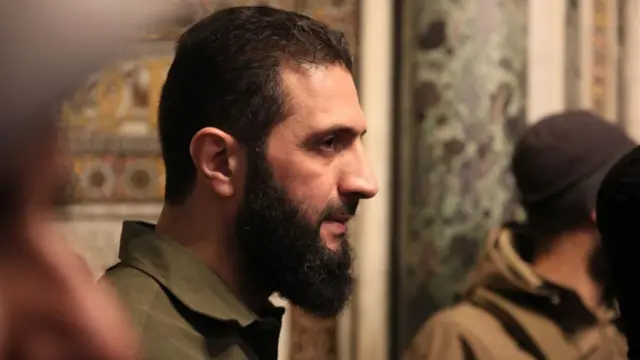
image source, Getty Images
In today’s newspaper presentation, we discuss articles focusing on the situation in Syria after the fall of Assad’s rule and the geopolitical changes in the region, including an article that believes that “the intensity of sectarian violence after the overthrow of the Assad regime was less than expected,” and another article on “Turkish influence in Syria and Israel’s fears of… its expansion,” and finally an article on “the challenges facing the new Syrian administration within the Arab regime in the future.”
We begin our tour with the American newspaper “Washington Post” and an opinion article written by Bassem Marwa entitled “Sectarian violence in Syria has been less severe than expected since the overthrow of Assad.” The writer begins his article by pointing out that rounds of sectarian violence occurred during the days that followed the overthrow of Assad, but they did not It reaches, in any case, the extent that was feared after nearly 14 years of civil war in Syria, according to the writer.
The writer believes that the great credit for this relative calm so far goes to Hay’at Tahrir al-Sham, which led the opposition against Assad and is helping to rebuild Syria and unite its many factions, after it pledged not to discriminate against any religion or race, and denounced retaliatory killings.
The writer points out that during the days that followed the fall of Assad, dozens of Syrians were killed in acts of retaliatory violence, most of whom were from the Alawite sect, to which the Assad family belongs, according to activists and experts monitoring the Syrian situation.
The writer says that given the major role played by Alawites in Assad’s repressive government, experts expected sectarian violence to be widespread, but Hay’at Tahrir al-Sham worked hard to reduce tensions in villages that witnessed retaliatory violence.
The writer highlights that during the Assad era, Syrians enjoyed religious and other freedoms, men and women mixed freely on beaches and other public places, and restaurants served alcoholic drinks. Women also held senior positions in government.

image source, Getty Images
The writer believes that after power became in the hands of Hay’at Tahrir al-Sham, many Syrians, Western governments, and human rights groups are concerned that Syria will turn into a religious state, even though the coalition led by Hay’at Tahrir al-Sham has not yet imposed any strict religious rules. , such as forcing women to wear the hijab, and journalists from all over the world were allowed to cover freely, and over the years of control in Idlib Governorate in northwestern Syria, Hay’at Tahrir al-Sham allowed Christians and Druze to practice Their religious rituals without interference, according to the writer.
The writer says that one of the top priorities of Hay’at Tahrir al-Sham and its leader, Ahmed al-Shara, is to be removed from the “terrorism” list, which may later lead to the lifting of economic sanctions imposed on Syria. US officials say that Shara’s statements in general about protecting the rights of minorities and women are welcome, but they doubt that his promises will be fulfilled in the long term.
The writer also spoke about reports of Al-Sharaa’s own efforts to maintain peace between the many Syrian factions, especially after he recently met in Damascus with a delegation from the Druze sect and told them that his goal was to unify Syria and create a free society, according to Syrian media.
The writer Bassem Marwa concludes his article by citing some Syrians’ visions of events and their belief that sectarian violence would have raged in the wake of the overthrow of Assad if the Syrian army had fought a serious battle against Hay’at Tahrir al-Sham and other armed opposition groups, but what happened was that Assad’s army basically disappeared and chose not to defend His government, in the words of the writer.
“Is tension escalating between Türkiye and Israel because of Syria?”

image source, Getty Images
We turn to the Israeli newspaper “Jerusalem Post” and an opinion article written by David Ben-Bassat entitled “Israel has a new neighbor – Turkey controls Syria.” The writer begins his article with a previous statement by Turkish President Recep Tayyip Erdogan, six months ago, in which he said: “We also entered Karabakh.” And in Libya, we will do the same in Israel.”
The writer believes that in light of the fall of Bashar al-Assad’s regime and Turkey’s shared borders with Syria, Erdogan’s statement, which essentially threatens a “ground invasion of Israel,” carries disturbing connotations, especially after Erdogan announced at a political gathering of the Justice and Development Party in Turkey, saying: “ “There’s nothing we can’t do, we just need to stay strong.”
The writer points out that “the dramatic collapse of the Assad regime and the victory of the Syrian opposition, some of whose factions enjoy great support and guidance from Turkey, should represent a warning bell to decision-makers in Israel.” He believes that the fall of Assad is an important turning point in the Middle East, with consequences for Israel, This creates a new and complex reality, which, in his opinion, requires a careful analysis of the potential impact on Israel, especially in light of its already tense relationship with Türkiye.
The writer believes that the vacuum left by Assad raises concerns about hostile entities, such as pro-Iranian militias and jihadist groups that are taking root along Israel’s northern borders. Turkey may also exploit this power vacuum to expand its influence, given its previous involvement in northern Syria, so tensions may rise between Israel and Turkey.
In contrast, some believe that the evolving geopolitical landscape may strengthen close relations between Israel and Turkey, motivated by common interests in stabilizing the region, according to the writer.
However, the writer says that these geopolitical changes in Syria come at a time when tensions between Israel and Turkey are growing, and the approach of Turkish-backed forces to Israel’s northern borders poses other risks.
Writer David Ben-Bassat concludes his article by warning Israel of the need to prepare for the challenges imposed on it by this changing landscape.
“Where is the future of Syria within the Arab system?”

image source, Getty Images
We conclude our tour with the London newspaper Al-Sharq Al-Awsat and an opinion article written by Muhammad Al-Rumaihi entitled “Syria and the Next Arab Regime.” The writer begins by noting that in the previous period the regional Arab system was no longer able to resist many challenges, describing this system as almost dysfunctional, because of “ The ideological squawk, in addition to Syria’s choice, under the Assad regime, father and son, to associate with another component outside the Arab system.
The writer believes that Syria, along with Egypt and Saudi Arabia, together constitute the base of the Levantine Arab regime. If this axis is able to cooperate constructively, others can join it on the basis of equality and common good.
The writer says that in recent years, “Al-Assad’s rule has matured and become subject to fall” for many reasons that are difficult to enumerate. From the internal repression that affected almost all Syrian components, and his absurd foreign policies, according to the writer.
The writer points out that many observers welcome the change in Syria, but there are some precautions that must be taken, including that one component cannot navigate Syria in the midst of regional and international changes, and that Syria in its Arab surroundings is safer and more capable of action. At the international level.
The writer adds that “the main challenge facing the new regime is that the new regime does not fall into the mistakes of the previous regime, which plunged Syria into oppression, poverty, fear, and isolation.” The writer proposes a “prescription” to get out of this impasse consisting of four pillars: First, a political system that guarantees freedoms for all citizens. And the Syrian components, and regulates the authorities. Secondly, an economic system that guarantees decent living away from totalitarianism and takeover. Thirdly, this is governed by a legal system that guarantees rights on the scale of human justice. Fourth, a free media system within the limits of modern laws.
The writer, Muhammad Al-Rumaihi, concludes his article by explaining that the slide into unilateralism, and attention to small things and formalities that are a contradiction to the times and reason… are taking the new Syrian regime, which is fragile, into dark entrances, turning others against it, and leaving it as a prey for regional powers that are ready to jump out the window after they leave the door. ! Because the paths that contradict the previous four points are “windows” through which others can jump on the capabilities of the Syrian people, according to the writer.
ظهرت في الأصل على www.bbc.com

